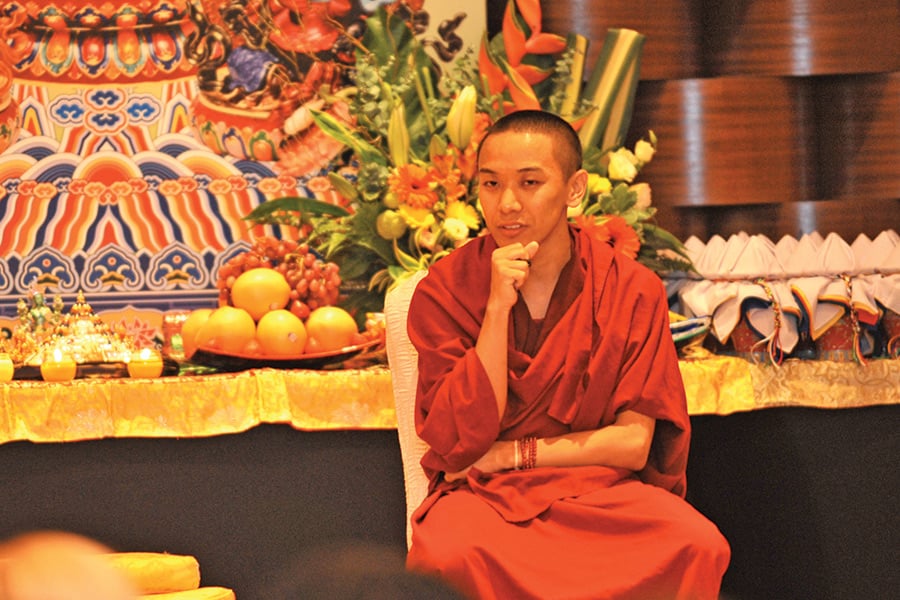
by Charok Lama Rinpoche
Charok Lama Rinpoche, officially recognised as the reincarnation of the most highly revered lama of the Solu Khumbu region of the Himalayas, is presently studying for his Geshe Degree at the prestigious SERA JEY Monastery in Southern India. Rinpoche also resides at Kopan Monastery in Katmandu, where he originally stayed when he was first discovered and recognised by LAMA ZOPA RINPOCHE. He has travelled widely with extensive teaching experiences in Singapore, Malaysia, New York, Hong Kong and Nepal, where he also hosts a popular radio program on Tibetan Buddhist matters. Rinpoche speaks and writes five languages fluently – Tibetan, English, Nepali, Sherpa and Hindu.
I believe most of those who will read this will be student rather than a guru, so therefore I’ll be focusing more on what a student should look for and do rather than what a guru should do.
I won’t go into details, but in order to understand the risks of breaking samayas, one will need to understand the qualities of a perfect guru and the qualities of a perfect student. After that, by accepting someone as your guru or student, you create a spiritual bond which includes karmic connection, faith, trust, vows and acceptance, and because all of these are included, unlike divorcing, if one breaks the samaya, it can affect your life, the life of the other person and your karma as well. Similar to someone you trust with all your heart breaking your trust, but with severe karmic consequences.
The Guru
A true Guru is not just a teacher but the embodiment of all good qualities, someone you take to be your mother, father, guide, spiritual friend and someone who can go beyond anything to bring you onto the right track in spirituality, and the cause to all your spiritual accomplishments. With you having the option to choose, you have to consider the fundamental qualities that a guru should have, before building that connection, and in order to do that, you need to know what a guru is for.
A guru is a guide you choose, to show you, instruct you and guide you through the spiritual path, by providing you the right methods to negate the worldly attachments, the destructive emotions, the self-grasping attitude and samsara, and by doing, so liberating you and bringing you onto the path to enlightenment, someone skillful enough to guide you with genuine love, compassion and understanding. With all these qualities, you should be ready to follow a person who emphasizes not on worldly gains, but on the practice of morality and ethics, liberation from samsara, and someone who emphasizes on cherishing others and letting go of the self-grasping attitude. All of these practices are to liberate yourself from the oceans of samsaric suffering, therefore the qualities of the teacher come not just from how much they know but how skillfully they apply it to their own lives; not how famous they are, but how genuine they are. By now, I’m sure you have a brief understanding on what kind of person you are looking for.
The Student
Similar to the Guru, one of the most important things is that the student also needs to be someone who is sincere and genuine in his or her practice. Open-minded and receptive to all the guru’s teachings, with a sincere motivation to receive teachings in order to develop compassion and attain enlightenment, and determined to listen, reflect and meditate upon the teachings, thereby your wisdom in it can grow.
Though you are allowed to ask questions and debate on what is being taught, your devotion has to be unshakable, therefore choosing a guru wisely is of utmost importance in your spiritual path, especially when it comes to Vajrayana. Since respect, reverence and devotion are a potential aspect of confidence, and confidence is the root to all other fundamental qualities, those who have these qualities can obtain the most out of it. And therefore devotion is necessary if you want to see development in your practice.
Breaking Samayas
Now that you have a brief understanding of what a spiritual bond is, and how it is formed, breaking that bond can result in hate, mistrust, anger and delusion like in any relationship, and because of the karmic and spiritual connections when you break the samayas, your link to spiritual development also degrades, because whatever development you have made through the guru comes from respect, trust, faith and contemplation on the teachings of the guru, which turns into mistrust, hate, negation and disbelieve, resulting in the degradation of the progress you have made so far, which leads to a karmic chain reaction with severe consequences.
Now let’s come into reality and talk about the issues we face in this modern society regarding breaking samayas with gurus. It’s a debatable topic when it comes to so-called gurus who go against your spiritual benefit and take advantage of you for their own worldly gain or pleasure, for these aren’t the qualities of a true guru in a general sense, because gurus are defined by the qualities they possess. If they lack those qualities, then they may be posers. The first mistakes from the student’s side comes from jumping into conclusions too fast and the lack of observation. I have heard that having a guru is trendy in these modern times, and it has become something to boast about, which actually is a very saddening thing to hear. And I believe that it’s one of the reasons why a lot of people have a hard time dealing with it afterwards. So observing and making sure that it’s not just someone calling themselves a guru but someone who is worth your trust and respect based on the qualities is something people seem to lack to do when looking for a guru.
Secondly, gurus aren’t trophies and collecting them won’t boost one’s practice. The relationship between the two is special because of a certain amount of sincerity, faith, trust, love and understanding built over time from both sides, the genuine willingness to guide from one side and the genuine willingness to listen and comply from the other side that makes it special, not to mention the karmic side as well. We very clearly live in a society which promotes competition and worldly views such as the ego-centric view, and we are so used to complying to these in our daily chores, that we start complying to them in our practice as well, which results in one’s egoistic worldly judgement of the gurus.
In Buddhism, a lot of things depend on the level of one’s own mind. Similarly, obedience and acceptance also depend on that, therefore when you take someone as your guru after observing, seeing the qualities, feeling the sincerity, hearing the truth and gaining the trust, then you proceed to create the connection or samaya.
And so faults you see in a guru may also come from your way of viewing things rather than from the guru’s side. In short, there are so many situations you can take into consideration and your judgements will start to become clearer and purer when you allow yourself to look at it from a wider point of view, from not just thought but also from feelings, not just from ones viewpoint but from the viewpoint of others as well.
In Buddhism, a lot of things depend on the level of one’s own mind. Similarly, obedience and acceptance also depend on that, therefore when you take someone as your guru after observing, seeing the qualities, feeling the sincerity, hearing the truth and gaining the trust, then you proceed to create the connection or samaya. A bond created by both sides through acceptance and willingness, a bond created through genuine thought and trust, a bond that will define your spiritual development and enlightenment, so such a bond shouldn’t be made out of worldly aims but with the aim to develop oneself inwardly, because this bond will be your path in developing all your qualities.
When it comes to a lifetime’s work, you shouldn’t take it lightly and you should give it great thought, and because of these reasons, breaking a samaya can result in great conflict within oneself. Similar to having experienced your best-friend breaking your trust, doubting and not being able to trust anyone after that.
Is what the guru says always right? The Buddha has said that every individual has his own mindset, and no two minds are ever the same, so what someone sees as reasonable may not be reasonable from your perspective, therefore, applying wisdom and logic to your observation and analysis to the words spoken by the guru is important. Here, I would draw a line between devotion and obedience. When it comes to gurus, devotion is a must, but never mistake it with the idea of being stripped away of your freedom to think, ask and analyze, and obey every single deed without question.
Though full obedience has been mentioned in the Vajrayana context, you have to take into consideration that a Vajra master who has taken you into the Tantric path is someone skilful, and either enlightened or close to enlightenment. Even the student who has entered the real tantric path is someone who has already negated the self-grasping ego, fully realised emptiness and is seconds away from enlightenment, therefore full obedience shouldn’t be a problem for someone who has entered the tantric path and who has fully conquered their mind.
























